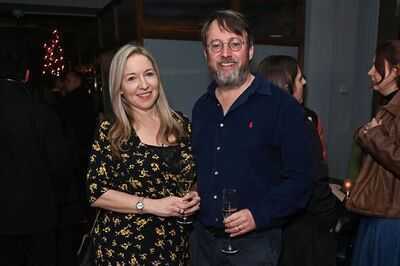
Diane Keaton, the Oscar-winning actor whose whimsical charm, disarming honesty, and unmistakable individuality lit up some of cinema’s most enduring films — from Annie Hall to The Godfather — has died at 79.
People magazine reported that Keaton passed away in California, cradled in the love of her family, according to a spokesperson. Though few details were released, the news swept through Hollywood like a sudden chill — a moment of disbelief that silenced even the most seasoned hearts, as friends, co-stars, and admirers mourned the passing of an artist who was, in every sense, utterly irreplaceable.
“She was hilarious, a complete original, and completely without guile,” wrote her First Wives Club co-star Bette Midler. “What you saw was who she was… oh, la, lala!”
Leonardo DiCaprio, who played her nephew in Marvin’s Room, remembered her as “brilliant, funny and unapologetically herself... she will be deeply missed.”
Keaton was the rare performer who seemed to shimmer from within — an actor who made vulnerability chic and eccentricity universal. With her bowler hat, loose khakis, and endearing “La-dee-da” refrain in Annie Hall, she became not just a character but an era’s spirit distilled — quirky, modern, and fiercely her own.
Diane Keaton entered the world as Diane Hall in January 1946 in Los Angeles, far from the silver screens she would one day grace. Born to a mother who was both homemaker and photographer, and a father who wove dreams in real estate and civil engineering, she was nurtured in a household where creativity flowed freely — a sanctuary that kindled her lifelong passion for the arts, from the elegance of fashion to the poetry of architecture.
After a brief stint in college, she moved to New York City, took her mother’s maiden name, and threw herself into the theatre world — studying under the legendary Sanford Meisner, whom she credited with teaching her to “play with fire and call it fun.”
Her Broadway debut came with Hair, followed by a Tony-nominated turn in Woody Allen’s Play It Again, Sam. Then came The Godfather (1972) — and suddenly, Diane Keaton was no longer the girl with stage dreams; she was Kay Adams, the moral heart of Francis Ford Coppola’s masterpiece. Though she would later admit she never fully related to Kay, her luminous restraint opposite Al Pacino etched the character into cinematic history.
The 1970s would become her golden decade. Her collaborations with Woody Allen — Sleeper, Love and Death, Interiors, Manhattan, and of course, Annie Hall — showcased her elasticity as a performer: cerebral yet spontaneous, funny yet fragile. The New York Times critic Vincent Canby called her “a marvelous nut.”
Her turn in Annie Hall earned her the Academy Award for Best Actress, followed by nominations for Reds (1981), Marvin’s Room (1996), and Something’s Gotta Give (2003). She would go on to embody countless women at life’s crossroads — the ambitious executive in Baby Boom, the bemused mother in Father of the Bride, the reinvented divorcée in The First Wives Club, and the radiant playwright in Something’s Gotta Give, a role she later called her favorite.
In Reds, directed by Warren Beatty (her partner at the time), she played journalist and suffragist Louise Bryant, matching Beatty’s intensity scene for scene. Later came another enduring collaboration — this time with filmmaker Nancy Meyers, whose sharp yet tender comedies gave Keaton room to dazzle as a woman aging on her own terms.
Off-screen, Keaton’s romantic life was storied but unconventional. Linked to Woody Allen, Warren Beatty, and Al Pacino, she never married, instead finding fulfillment in motherhood later in life by adopting two children, Dexter and Duke. “Could I have made a lasting commitment to them?” she mused in her 2012 memoir Then Again. “Subconsciously I must have known it could never work — they’d never get in the way of achieving my dreams.”
Keaton also ventured into directing, helming an episode of Twin Peaks, the feature Hanging Up, and even a Belinda Carlisle music video. As the decades passed, she remained a creative force — writing memoirs, designing homes, and embracing her signature aesthetic of turtlenecks, tailored suits, and wide-brimmed hats that became as iconic as her performances.
In 2017, she received the AFI Life Achievement Award, calling it “the wedding I never had, the big bash I always avoided.” And in 2022, as her hands and footprints were immortalized outside the TCL Chinese Theatre, she told reporters simply: “I don’t think about my legacy. I’m just lucky to have been here at all.”
Diane Keaton’s magic was never in imitation but in authenticity — a refusal to be anyone but herself. In her laughter, her hesitations, and her fearless curiosity, generations found something ineffably human. She didn’t just act; she inhabited the contradictions that make us alive.
Her death leaves a void — but her spirit, playful and profound, lingers in every woman who dares to be entirely, gloriously herself.
With AP inputs
-
Court grants hotel interim stay on GST for eatery services

-
32 cases registered against celebrity hair stylist Jawed Habib in Sambhal

-
US Vice President JD Vance says US holds more cards in escalating China trade spat

-
Victoria Coren Mitchell 'frightened all the time' as she admits 'I'll never be free again'

-
TN mulls proposing Samanatham tank as Ramsar site for wetland conservation
